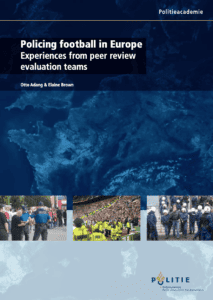A Peer Review is generally known as an evaluation method of scientific publications. Peer reviews of police crowd operations are used as a tool for organizational learning, to foster internal reflection and mutual learning. This method was “invented” at the Police Academy of the Netherlands. Initially they were used in order to evaluate the policing of international football games, meanwhile the peer review method has been used in several countries and on different occasions, they are an integral tool of organizational learning in the Netherlands and other European countries.
Important characteristics of a peer review are
- the voluntary aspect – a peer review must be requested from the responsible police authority.
- the emphasis on learning – unlike methods that focus more on mistakes and responsibilities.
- Immediacy – as peer reviews take place during the event, the evaluators will be at the heart of the event, speak – if possible – directly with stakeholders, participants and citizens and observe the goings on.
- confidentiality – the feedback will only be given to the client and persons he chooses
- mixed teams – we will always mix up local police officers and other professional personnel selected by the client and our experienced experts to allow the local team members to learn the method and add their knowledge in the review.
The request for a peer review will be (preferably a few weeks before the event) addressed to a coordinator who is also responsible for ensuring the methodological integrity. He or she will then discuss the specific questions which the host (or requesting organization) wants to be answered by the peer review.
Our Team
Prof. Dr. Otto Adang
Dr. Martina Schreiber
Dr. Elaine Brown
Dr. Bernd Bürger
Peer Review Procedure
Preparation Phase
You contact us at [email protected] and tell us about the event where you consider a peer review. Based on your information and your specific needs, we will develop an evaluation plan, that fits your needs. In general a peer-review is carried out according to the following structure:
Day 1 Briefing and planning
The peer review team arrives on the day before the review is carried out. The team members will be met by the host or a representative and be briefed on the planned operation, consult relevant documents and familiarise with sites. The „Peer Review Rules“ are addressed by our coordinator, i.e.: safety first, confidentiality, no interference with the operation, etc. For new team members, who have not received a training, there will be an introduction into the methodology and process. Based on the information received, the team will then adopt its evaluation plan for observations and interviews, identifies what data will be gathered, in what way and by whom.
Day 2 The event
The team will start the actual data gathering according to the evaluation plan that has been agreed on. Usually, this includes attending briefings, conducting short semi-structured field interviews with police officers from different levels, participants, citizens and other stakeholders (typically between 30 and 100 field interviews are held during a peer review). Observations always include police- citizen interactions. Team members will always be free to go where the evaluation plan requires them to go. They are instructed to take notes contemporaneously and not to rely on memory.
Day 3 Analysis and report writing
The team members share the data that have been collected and discuss their experiences. The discussion is chaired by our coordinator who will ensure that the structure is being followed. The scientific assistant takes notes and summarizes the discussion; this draft report is projected on the wall during the discussion so that all team members can check and agree on it.
In the weeks after the peer-review the draft report is finalised by our coordinator and the scientific assistant. It will be sent to the team members for a final check. The final version is then passed on to the host. We also recommend a debriefing with the host, the responsible police leaders and our coordinator and the scientific assistant to discuss the results in depth.
More Information
If you want to have more information, contact us: [email protected].
Also feel free to read more about the peer reviews:
 | Adang, O. & Brown, E. (2008): Policing football in Europe. Experiences from peer review evaluation teams. Apeldoorn, Politieacademie. Otto Adang: Nonadversial peer reviews of policing operations: fostering organizational learning. European Journal of Policing Studies. |

